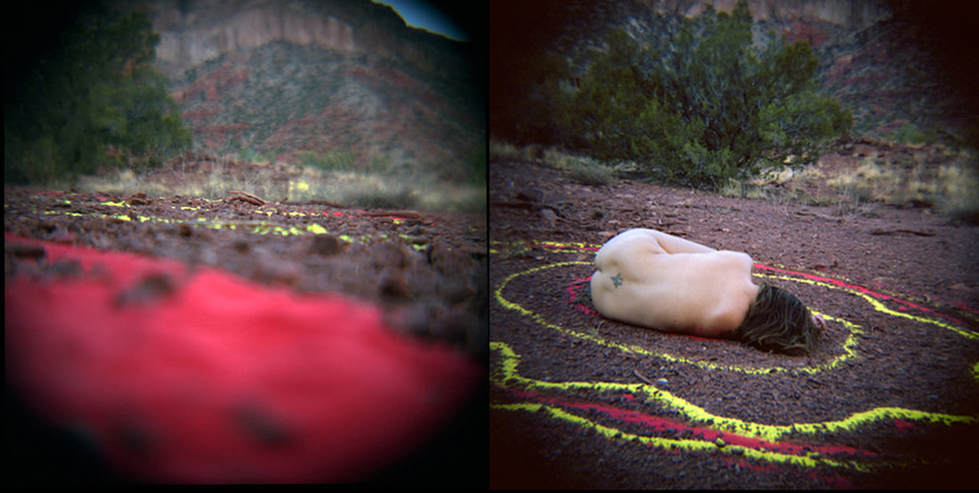And He Told Me The Land Was Memory
Y El Me Dijo Que La Tierra Era Memoria
My Colombian roots, my Latin American heritage, and the inner conflicts of being away for over two decades in an unfamiliar country have been the influence of all my work. I am interested in posing questions about my own identity; how has my culture shaped me, and how has this perception of myself changed over the years as a detachment from my community started taking place.
How do we preserve traditions and family legacies, when we have been separated or distanced from our culture, family, and folklore? How do we carry the traditions that were handed down to us when we find ourselves removed from our native surroundings? What do we do with what we have inherited without asking?
I feel a responsibility with my past and my history, and a desire to sustain a narrative in the attempt to preserve intra-cultural traditions.
Legacies rescued as ancestral remains, memory transferred as visual language.
How do we preserve traditions and family legacies, when we have been separated or distanced from our culture, family, and folklore? How do we carry the traditions that were handed down to us when we find ourselves removed from our native surroundings? What do we do with what we have inherited without asking?
I feel a responsibility with my past and my history, and a desire to sustain a narrative in the attempt to preserve intra-cultural traditions.
Legacies rescued as ancestral remains, memory transferred as visual language.
Self Cleansings
Auto Limpias
Researching, experiencing and documenting other cultures as well as my own has been a big part of my photographic journey. My work is an exploration of my personal history and cultural identity and an investigation of the repercussions of heritage separation and ancestry evolution.
In 2008 I traveled through out Salvador, Bahia, in Brazil. It is a place I was eager to explore because of its African descent, mixed traditions and its invaluable historic importance as the first place our black Mothers were brought into Latin America. This is when this symbolic body of work started to emerge.
Inspired by moments witnessed in my travels and while growing up in Colombia, I recreate and invent cleansing rituals with elements of shamanistic practices to reconnect with my ancestors.
These images have been my reaction to my experiences overseas, in contrast with my then present reality in the United States.
In 2008 I traveled through out Salvador, Bahia, in Brazil. It is a place I was eager to explore because of its African descent, mixed traditions and its invaluable historic importance as the first place our black Mothers were brought into Latin America. This is when this symbolic body of work started to emerge.
Inspired by moments witnessed in my travels and while growing up in Colombia, I recreate and invent cleansing rituals with elements of shamanistic practices to reconnect with my ancestors.
These images have been my reaction to my experiences overseas, in contrast with my then present reality in the United States.
A Harvest of Memories
Cosechando Memorias
In 2003 I started a documentary project about the people that still dedicate their lives to grow and harvest coffee in the mountains of Colombia. I spent six months recording the main harvest in the coffee region of this country.
What started as a personal project to re-encounter my roots and pay homage to my heritage, has become now a broader investigation of a community’s search to rescue a national tradition. A tradition that once was one of the main aspects of our cultural identity and now is almost lost and overshadowed by our country’s vicious circle of narco-terrorism, corrupt governments and their many consequences.
I felt the responsibility to give a visual voice to the people that despite their losses still believe in their country, in themselves, and in their land; a community that still wants to raise its children within all the customs that surround the coffee culture in order to be passed on to the next generation.
What started as a personal project to re-encounter my roots and pay homage to my heritage, has become now a broader investigation of a community’s search to rescue a national tradition. A tradition that once was one of the main aspects of our cultural identity and now is almost lost and overshadowed by our country’s vicious circle of narco-terrorism, corrupt governments and their many consequences.
I felt the responsibility to give a visual voice to the people that despite their losses still believe in their country, in themselves, and in their land; a community that still wants to raise its children within all the customs that surround the coffee culture in order to be passed on to the next generation.

